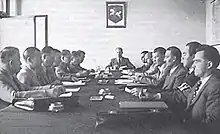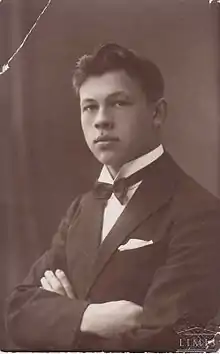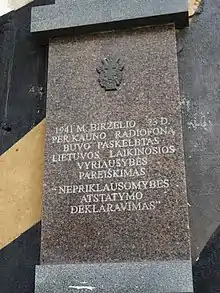Provisional Government of Lithuania
The Provisional Government of Lithuania (Lithuanian: Laikinoji Vyriausybė) was a provisional government aiming for independent Lithuania during the last days of the first Soviet occupation and the first months of German occupation of Lithuania during World War II in 1941.

It was secretly formed on 22 April 1941, announced on 23 June 1941, and dissolved on 5 August 1941.[1] It was formed from the members of the Lithuanian Activist Front (LAF) in Kaunas and Vilnius.
History
"Attention! Attention! This is Kaunas speaking. Independent Lithuania. Declaration of the restoration of Lithuania’s independence. Formed Provisional Government of the newly reborn Lithuania declares that it is restoring the free and independent state of Lithuania. In front of the pure conscience of the whole world, the young state of Lithuania enthusiastically promises to contribute to the organization of Europe on a new basis. The Lithuanian nation, tormented by the brutal Bolshevik terror, decided to build its future on the basis of national unity and social justice."
— Leonas Prapuolenis, the first announcement of the Provisional Government through the recently captured Kaunas' radio.[2][3]

_newspaper.jpg.webp)

The provisional government was confirmed on 22 June 1941 at the start of the June Uprising. However, the leader of the LAF, Kazys Škirpa, who was supposed to become the prime minister, was in Berlin at the time, hoping to obtain recognition for Lithuania (he was also former Lithuanian envoy to Germany and therefore continued to reside there). Since the Nazi regime saw Lithuania as a future part of Greater Germany, it was not much interested in Lithuanian independence, but allowed the Provisional Government to operate while it was useful. Kazys Škirpa was not allowed to leave Germany; instead, he was put under house arrest. Rapolas Skipitis, another minister-to-be who also was in Berlin at the time was prevented from leaving as well.[4]
Vytautas Bulvičius, who was intended to become Minister of Defence, was arrested by the Soviet forces on 2 June. His place was therefore taken by General Stasys Raštikis. On 21 June 1941 (just one day before Germany declared war on the Soviet Union), four members of the planned government were arrested by the Soviets: Vladas Nasevičius, Vytautas Statkus, Jonas Masiliūnas, and Jonas Vainauskas. They were imprisoned in Gorky (now Nizhny Novgorod). The tribunal started on 26 November 1941 (after the uprising had ended, and while Lithuania was still occupied by Germany). Sentences were pronounced on 28 November: Bulvičius was executed, while Masiliūnas, Nasevičius, and Statkus were exiled to Siberia, along with other people arrested at the same time.
Literary historian Juozas Ambrazevičius-Brazaitis became acting prime minister instead of Škirpa.
In a Yad Vashem publication, Vygantas Vareikis writes that the Lithuanian Provisional Government "did not encourage brutal actions" against Jews and the LAF leaders as well as the local press proposed that only high-ranking Communist officials and members of the NKVD should be punished by death.[5] The Provisional Government did little to stop the anti-Jewish violence encouraged by the Nazis and the anti-Semitic leadership of the Lithuanian Activist Front. Lithuanian police battalions formed by the Provisional Government helped the Nazis carry out the Holocaust.[6]
The Provisional Government dissolved itself in August 1941 after failing to achieve its goal of an autonomous if not independent Lithuania under German patronage.
Cabinet
The people who were meant to be in the government:[7]
- Prime Minister: Colonel Kazys Škirpa (was prevented from assuming the position and placed under house arrest in Berlin)
- Education/Acting Prime Minister: Juozas Ambrazevičius-Brazaitis
- Defense: Major Vytautas Bulvičius (arrested by Russians on 2 June, executed in November), later General Stasys Raštikis
- Foreign affairs: Rapolas Skipitis (was not able to leave Berlin)
- Internal affairs: Vladas Nasevičius (arrested by Soviets on 21 June, later exiled to Siberia)
- Finance: Jonas Matulionis
- Health Ksaveras Vencius
- Trade: Vytautas Statkus (arrested by Soviets on 21 June, later exiled to Siberia)
- Industry: Doctor engineer Adolfas Damušis
- Agriculture: Professor Balys Vitkus
- Social security: Doctor Juozas Pajaujis-Javis
- Infrastructure: Engineer Vytautas Landsbergis-Žemkalnis
- Communication: Jonas Masiliūnas (arrested by Soviets on 21 June, later exiled to Siberia)
- Controller of state: Jonas Vainauskas (arrested by Soviets on 21 June)
See also
References
- Jegelevičius, Sigitas (11 June 2004). "1941 m. Lietuvos laikinosios vyriausybės atsiradimo aplinkybės". Voruta (in Lithuanian). 11 (557). ISSN 1392-0677. Archived from the original on May 7, 2006.
- "Tikros istorijos. Tverečiaus parapijai 500 metų (recording from 1:20 to 2:17)". Lrt.lt (in Lithuanian). 2001-06-28. Retrieved 7 June 2021.
- Jegelevičius, Sigitas. "Lietuvių savivalda ir vokiečių okupacinė valdžia: tarp kolaboravimo ir rezistencijos". Genocid.lt. Genocide and Resistance Research Centre of Lithuania. Retrieved 7 June 2021.
- "Kuo reikšmingas 1941 m. birželio 22-28 d. sukilimas?". LLKS.lt. Archived from the original on 21 June 2019. Retrieved 20 June 2014.
- Vareikis, Vygantas (2009). "In the Shadow of the Holocaust: Lithuanian-Jewish Relations in the Crucial Years 1940-1944". In Bankier, David; Gutman, Israel (eds.). Nazi Europe and the Final Solution. Yad Vashem. p. 255. ISBN 978-1-84545-410-4.
- Sužiedėlis, Saulius. "The Burden of 1941". Lituanus Lithuanian Quarterly Journal of Arts and Sciences, Volume 47, No. 4 (Winter 2001).
- Zemlickas, Gediminas (February 11, 1998). "Pasaulyje — kaip savo namuose". Mokslo Lietuva (in Lithuanian). 3 (161). ISSN 1392-7191. Archived from the original on December 12, 2006.